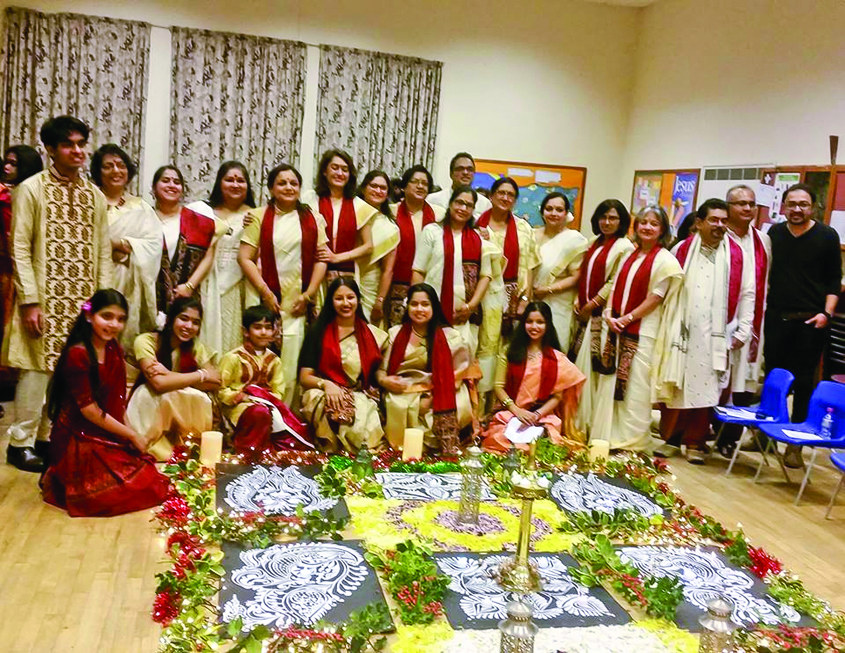So impressed by the programme and the message it conveyed, Dee Livington, one of the spectators, has already started doing some research work on the first Asian Nobel Laureate. Thanks to her two British-born Bengali students who invited her to watch Christo Utsav at Cheadle Hulme Methodist Church in Manchester, UK.
“While watching the programme, I could feel the sea of humanity soaring high. It made me realise how ignorant we are in so many ways,” said Livington, who is an atheist born into a Christian family.
This Manchester-based maths teacher said that despite the language barrier, Tagore’s songs like “Jagata Jure Udaar Shure”, “Tai Tomar Ananda Amar Por” or “Akash Jure Shuninu Oi Baje”, “filled my heart; there’s joy and serenity in all these songs that connects everybody”.
It took the audience back to the Christmas celebration of 25 December 1910, when Tagore initiated Christo Utsav in Shantiniketan.
The students of Surangon entered the hall with diyas or lamps in a procession known as “Baitalik”.

The ambience was nothing less than the one usually experienced in West Bengal especially during this festive season. The floor of the church was adorned with alpana (rangolis), lights and candles; female choristers were dressed in white sarees while males in their traditional Bengali dhoti and kurta with Batik print Uttorio, were enough for the expats to remember their bygone days spent in India.
According to Ballari Banerjee, the principal of Surangon, “Tagore’s reflection on Christianity as expressed in a series of Christmas Day sermons that started in Santiniketan in 1910 show how important Jesus and Christianity were to him. His interpretation of Christ’s life and teaching was entirely unconnected with any Christian church though.”
In a letter to his friend, Charles Freer Andrew, a Christian missionary, educator and social reformer in India, Tagore wrote, “I have read your book on Christ. It made me think. The mode of expression in a Christian Life is in love which works, in that of a Hindu it is in love which contemplates, enjoys the spiritual emotion as an end in itself. The attitude of mind that realises the super-human in a human setting has rendered a great service to civilization, just as its perversion has been the cause of an awful and widespread mischief.

“You know, how all through my life, my idea of the divine has concentrated in man the Eternal and I find that in your own religious experience. You have the same idea centered in a concrete historical personality.”
The Bard remains a towering figure whose literary works have enriched not only the educational, social and cultural environment in India but also helped to establish a rapport between the East and the West.
He came to England in 1878 to seek a career as a barrister but this didn’t bear the fruit he desired. Tagore instead returned to Calcutta (present day Kolkata), and established himself as a writer. At the age of 51, he revisited England where he translated his Gitanjali.
Praising Tagore’s Christo Utsav, Sharmista Ghosh said, “The festival assumes greater significance for the sheer spirit of tolerance it conveys.”
Rashmi Dave, a student of Surangon, said: “Although I am a non-Bengali, but I love singing Rabindra Sangeet. Initially, I struggled with the pronunciation, but Ballari di and other Bengali ladies helped me with the songs. As I picked up the tune and the pronunciation while practicing in a group, rehearsing on my own helped me to get better in this genre of music.”
Later, the proceeds were donated to a UK-based charity organisation called Pankhurst Trust, in aid of victims of domestic violence.
Rishi Banerjee started learning Rabindra Sangeet at the age of three under the guidance of his mother. Later, he was trained by none other than Pramita Mallick, one of the most prolific exponents of Rabindra sangeet. He continues training in both Hindustani classical music traditions of Khayal and Dhrupad with Chiranjib Chakraborty.
Rishi has been fortunate to perform across the globe with the likes of actress Sharmila Tagore and musician Pandit Birju Maharaj. He has released three albums and is working on his next album to be launched in 2017.

